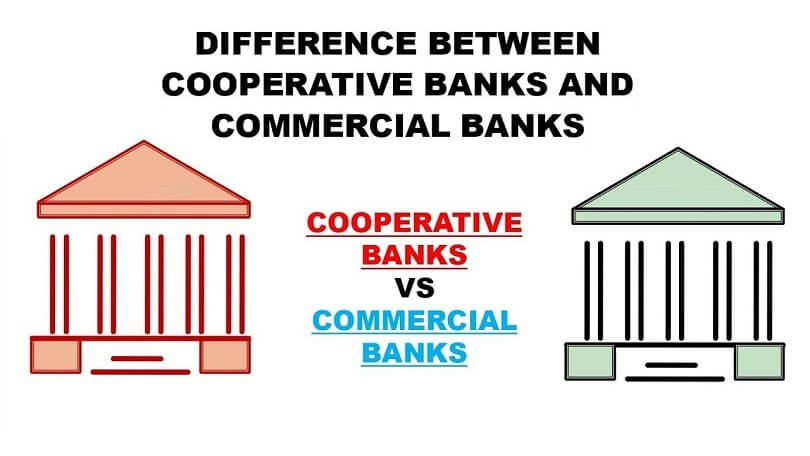The difference between a commercial bank and a Cooperative Bank is that the cooperative bank is an organization that provides banking services to members of its association, while the commercial bank offers all types of financial services. The cooperative’s membership can be based on location, profession, or other categories. It was first created by Friedrich Wilhelm Raiffeisen in 1847 as an alternative to traditional banks for people who had been rejected from traditional lenders because they were too poor.
The cooperative bank is owned by its members, while the commercial bank is owned by shareholders. The cooperative bank focuses on relationship banking, while the commercial bank focuses on profit maximization. Finally, the cooperative bank offers more personalized service, while the commercial bank has a more standardized approach to customer service.
What is a Cooperative bank?
A cooperative bank is an organization that provides banking services to members of its association. The cooperative’s membership can be based on location, profession, or other categories. It was first created by Friedrich Wilhelm Raiffeisen in 1847 as an alternative to traditional banks for people who had been rejected from traditional lenders because they were too poor.
Three different types of cooperative banks are:
- Primary Credit Society: a cooperative bank that offers loans to its members and is located on town levels.
- Central Cooperative Banks: a cooperative bank that provides loans to other primary credit societies and is located on district levels.
- State Cooperative Bank: a cooperative bank that provides loans to other Central Cooperative Banks or commercial banks and is located on state levels.
What is a commercial bank?
A commercial bank is an organization that offers all types of financial services. The commercial bank is owned by shareholders, while the cooperative bank is owned by its members. The cooperative focuses on relationship banking, while the commercial bank focuses on profit maximization. Finally, the cooperative’s personalized service differs from a more standardized approach to customer service in a commercial bank.
Commercial banks offer a wide range of services to their customers, which include:
- Depositing and withdrawing cash
- Checking account management
- Loans and credit products
- Investment products
- Mortgages
The Cooperative bank offers similar services but also focuses on providing banking products and services to rural communities and small businesses. They may have a smaller network than commercial banks, but they offer more personalized service. So, if you’re looking for a bank that can help support your small business, the Cooperative bank is a good option.
Commercial banks are FDIC insured while the Cooperative bank is NCUA insured, which means that depositors of the Cooperative bank are covered up to $250,000 per account. So if you’re looking for added security, the Commercial bank may be a better option.
There are pros and cons to both commercial banks and Cooperative banks, so it’s important to do your research before deciding which one is right for you. And remember, as with any financial decision, it’s always best to consult your financial advisor.
Cooperative Bank Vs. Commercial Bank:
The difference between both the banks is of operating procedures, business models, governance structure, and ownership. Cooperative banks are owned by its members while the commercial bank is owned by shareholders. Another difference that makes the two different than each other is that cooperative banks mostly focus on relationship banking whereas commercial banks purely focus on profit maximization.
The customer service offered in both these types of organizations differs from one another due to their different business models. Cooperative banks offer more personalized services as compared to commercial banks which have a standardized way of dealing with their customers.
Difference Between Commercial Bank and Cooperative Bank
- Cooperative banks are owned by their members while commercial banks are owned by shareholders.
- Cooperative banks focus on relationship banking, while commercial banks focus on profit maximization.
- The customer service offered in cooperative banks is more personalized than that of a commercial bank.
- Commercial banks have a standardized approach to customer service.
- Cooperative banks offer more products and services than commercial banks.
- Commercial banks are regulated by the government, while cooperative banks are not.
- Cooperative banks have a decentralized governance structure, while commercial banks have a centralized governance structure.
- Cooperative banks are smaller than commercial banks.
- Commercial bank employees make more money as compared to cooperative bank staff.
- Loans given by cooperative banks carry a lower interest rate as compared to loans offered by commercial banks.
Conclusion
The cooperative bank and the commercial bank are two different types of financial institutions that offer different services to their customers. The cooperative bank is owned by its members while the commercial bank is owned by shareholders. The Cooperative focuses on relationship banking, while the Commercial bank focuses on profit maximization. Finally, the Cooperative offers more personalized service, while the Commercial bank has a more standardized approach to customer service.

